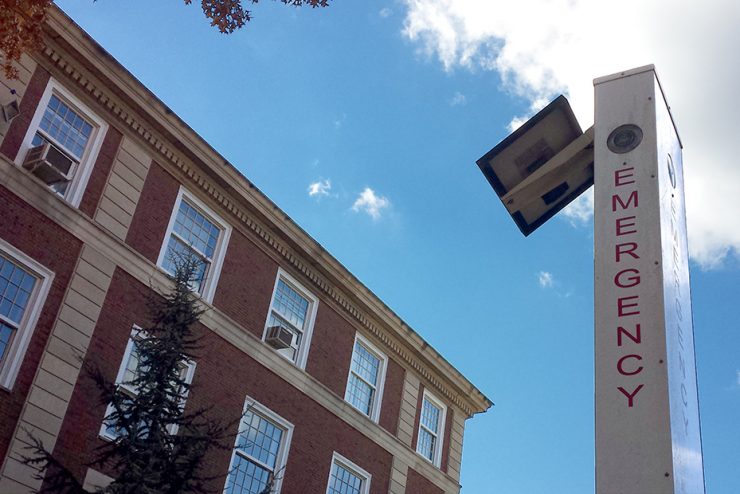Report a Crime
Victims or witnesses are encouraged to report all incidents to Adelphi University Public Safety (or the local police department if appropriate), regardless of how insignificant the crime may seem.
Public Safety or police officers will respond at any time of day or night to meet the victim/witness, take a report, investigate the incident, and provide assistance.
Reporting Procedures
When calling, stay on the line until told to hang up and as accurately as possible, tell the dispatcher everything you can remember about the incident (e.g., sex of suspect, the suspect’s clothing, vehicle, direction of travel, etc.). The Adelphi community is encouraged to program the Public Safety telephone number into their phones in case of an emergency.
You may choose to call 911 to report emergencies that require immediate response from police, fire, medical or other emergency units at any location. Be specific relative to your location. Specify that you are at Adelphi University with a specific building location.
Garden City Campus
- Dial 5 or ext. 3507 or 3511 from any in-house telephone
- Utilize any blue light emergency call box or pick up any red phone
- Contact any public safety officer or respond to the Public Safety Command Center located on the west side of Levermore Hall
- Via a cell phone, please call 516.877.3511
- For emergencies call 911
Hauppauge Center
- Call 631.300.4367 or 516.237.8605 or contact the contract officer located at the entrance of the Adelphi area. For emergencies call 911.
NYC-Brooklyn Center
- Call 718.489.2100 or 718.489.2105 or contact the SFC Security Guard located in the Lobby at the SFC Campus Security desk. For emergencies call 911.
Hudson Valley Center
- Call 845.471.3348 or contact the contract officer at the main entry to the Adelphi area located on the fourth floor. For emergencies call 911.
Local Law Enforcement
If you would like to contact the local police department, you can do so with the following information.
Garden City Police Department
- 349 Stewart Ave, Garden City, NY 11530
- 516.465.4100 or for emergencies call 911
New York City Police Department 84th Precinct
- 301 Gold Street, Brooklyn, NY, 11201
- 718.875.6811 or for emergencies call 911
Town of Poughkeepsie Police Department
- 19 Tucker Drive, Poughkeepsie, NY 12601
- 845.485.3666 or for emergencies call 911
Suffolk County Police Department 4th Precinct
- 727 Veterans Memorial Hwy, Smithtown, NY 11787
- 631.854.8400 or for emergencies call 911
Emergency Phones
Adelphi University has several phone towers located across campus for use in emergency situations. When in use, a blue flashing light will illuminate to help indicate your location and signal that immediate help is needed.
Privacy vs. Confidentially
A private resource means that information about a violation or incident is shared with a limited circle of University employees who “need to know” in order to assist in the assessment, investigation, and resolution of the report.
Adelphi University offices and employees who cannot guarantee confidentiality, will maintain your privacy to the greatest extent possible. Private University resources include the Title IX Coordinator, the Department of Public Safety, Responsible Employees, and Campus Security Authorities.
A confidential resource means that information shared to the below resources will not disclose what you tell them to anyone else at the University or outside it. The only instances where information may be disclosed is when:
- the individual gives written consent for its disclosure
- there appears to be a risk of immediate harm to self or others
- the information concerns conduct involving suspected abuse or neglect of a minor under the age of 18.
Confidential Resources
The following classifications of individuals are Confidential Resources under University policy. Please note, however, that if you disclose information that you wish to remain confidential to para-professional staff, such as administrative assistants, they may be required by law to pass along the report to Public Safety as a Campus Security Authority or a Title IX Coordinator as a Responsible Employee.
Our Response to Reports
Professionally trained and licensed public safety officers accept written reports of any incidents that occur at all Adelphi locations.
Copies of all reports are kept on file in the office of the Department of Public Safety and Transportation on the Garden City Campus and distributed to the appropriate people (departments) at each location. Follow-up investigations are performed and the local police department is notified when appropriate.
Investigations
Investigations, by the Department of Public Safety, are conducted by the Associate Director of Administration and Investigations or designee. Investigations are done on reports such as: civil, criminal and campus policy violations, aided cases, domestic issues, motor vehicle accidents and any incident the department determined that further investigation was prudent.
Complainants, witnesses, victims, and person(s) of interest are all subject to interview. Investigations often lead to contacting and working closely with departments within the university as well as law enforcement agencies, fire department personnel, and hospitals.
Understanding Differences Between NY State Law and University Discipline
The New York State Education Law Article 129-B requires that college/university or other officials explain the differences between college/university processes and the criminal justice process in addressing sexual and interpersonal violence.
There are significant differences between the two systems because they have different, important goals. In the criminal justice system, prosecutors pursue cases when they believe there is sufficient evidence to prove, beyond a reasonable doubt, that an individual has committed a criminal act. A person who is convicted of a crime will face criminal penalties, such as incarceration, probation, or the imposition of a fine.
The university disciplinary process seeks to determine whether an individual has violated college policy. In this process, a preponderance of the evidence standard of proof is used to determine responsibility. A person who is found to have violated university policy may be suspended, expelled or otherwise restricted from full participation in the college community.
The following table is intended to help outline the differences between the criminal justice system and university disciplinary processes.

